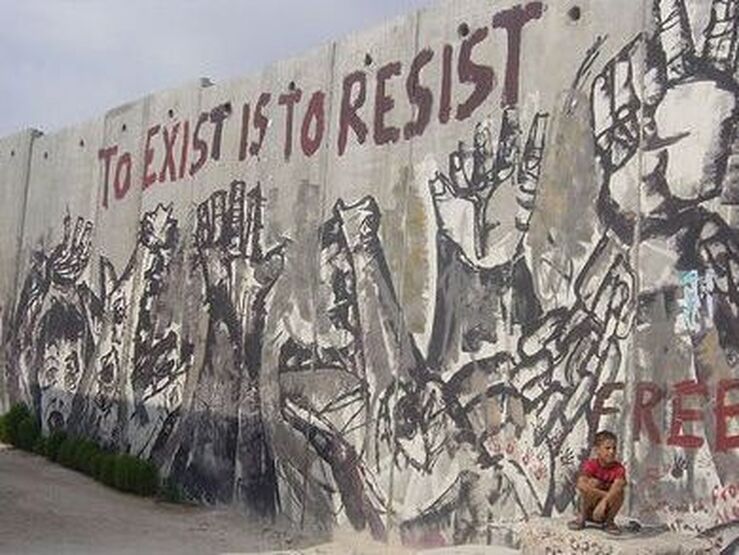|
|
|
I have been researching the activism of Israeli radial leftist movements for a decade now. Travelling to Palestine-Israel throughout the past years, speaking to activists and observing protests prompted me to examine the role of Jewish-Israeli activists in resisting the occupation and colonisation of Palestine. My empirical research on the Anarchists Against the Wall contributes to a growing body of activist-scholarship which highlights the emergence and consolidation of decolonial co-resistance (as opposed to the accommodative notion of co-existence) as an increasingly important aspect of joint Palestinian and Jewish-Israeli activism since the outbreak of the Second Intifada.
In 2003 during the Second Intifada Israel made a unilateral decision to build a wall beyond the Green Line in response to Palestinian militancy in order to protect Israeli civilians from political violence. The separation wall was built largely on Palestinian land, circling and incorporating the illegal Israeli settlements into Israel-proper, directly undermining the borders of the two-state solution. The building of the wall promoted widespread Palestinian resistance including weekly Friday demonstrations in the villages affected by the wall, raising international awareness, petitioning the Israeli High Court against village land confiscations and petitioning the International Court of Justice which ruled the wall’s construction in violation of international law in 2004. In many respects, the Palestinian struggle against the wall is a continuation of the Palestinians’ long-established tradition of non-violent resistance and civil disobedience against the Occupation.
Alongside local Palestinian resistance and international solidarity activism against the wall, the Jewish-Israeli anarchists emerged as a significant group. Their activism bears a close resemblance to the activities of the International Solidarity Movement, including attending the protests against the wall in order to discourage military violence against the Palestinians, as well as using their privileged status as Jewish-Israeli citizens to travel abroad to raise awareness of the struggle (an activity that is practically impossible for many Palestinian activists who are often denied the right to travel by Israel). In attempting to distinguish themselves from their international counterparts, Israeli activists argued that their activism cannot be reduced to straightforward solidarity because the Occupation negatively impacts Palestinians and Israelis alike. Palestinians on their end argued that this position draws problematic crude equivalences between the colonised and the coloniser, and the occupied and the occupier.
Drawing on nearly two decades of archival material, including academic, activist and media interviews with, and accounts of, the Anarchists Against the Wall, my Identities article, 'Vulnerability as a politics of decolonial solidarity: the case of the Anarchists Against the Wall', discusses how Palestinian critiques of Jewish-Israeli structural privilege resulted in the transformation of these activists’ discourses and practices. These critiques have driven the Israeli activists to reflect on, confront and face their privileged structural position as settlers. This involves an acknowledgement that their privilege is premised on the settler-colonial dispossession of the Palestinians. This acknowledgement prompted the emergence of an ethic that I call 'decolonial solidarity.' Decolonial solidarity is premised on an explicit rejection of the settler-colonial framing of the indigenous Palestinians as a threat, and the adoption of a practice of human shielding (whereby Israeli activists use their bodies to protect Palestinians) which uses vulnerability to injury as a tool for protection against settler-colonial violence. Paradoxically, the use of settler-privilege to protect Palestinian lives reinforces the existing settler-colonial racial hierarchies of whose life matters. Put differently, the use of privilege can enshrine privilege while seeking to dismantle it. This constitutes a significant obstacle for decolonial activism and for the possibilities of meaningful co-resistance and decolonisation in Palestine-Israel.
Blog post by Teodora Todorova, University of Warwick, UK
Read the full article: Todorova, Teodora. Vulnerability as a politics of decolonial solidarity: the case of the Anarchists Against the Wall. Identities: Global Studies in Culture and Power. DOI: 10.1080/1070289X.2019.1647663
0 Comments
Your comment will be posted after it is approved.
Leave a Reply. |
|
Explore Identities at tandfonline.com/GIDE |
|
The views and opinions expressed on The Identities Blog are solely those of the original blog post authors, and not of the journal, Taylor & Francis Group or the University of Glasgow.

